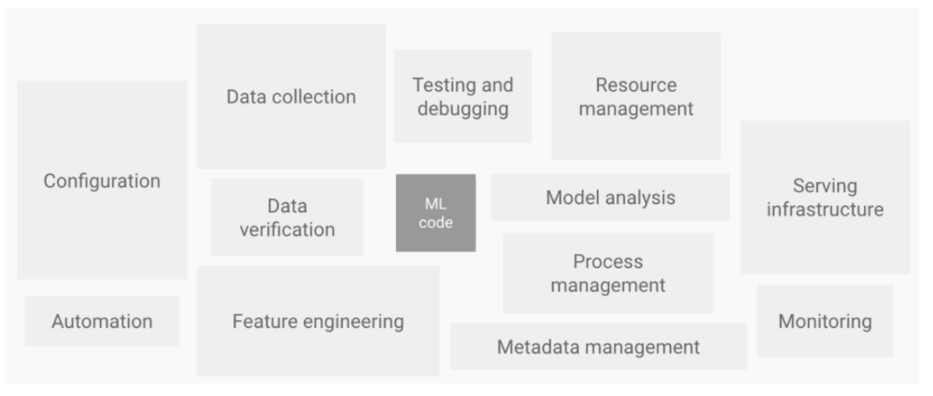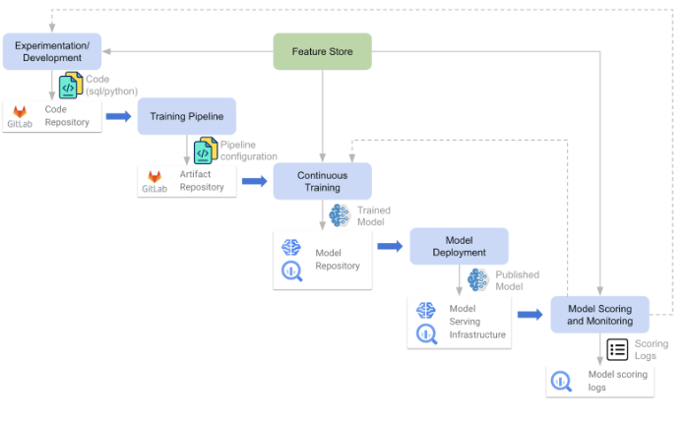Share this
What is MLOps and why is it important?
by Bart Marseille on May 17, 2022 10:11:19 AM
%20(17).jpg?width=706&height=397&name=Blog%20Format%20(1120%20%C3%97%20630px)%20(17).jpg)
Machine learning (ML) has been a buzzword going around the tech industry for quite some time. And yet, though everybody knows of it, companies fail to implement it, or ML doesn’t bring the promise of delivering (financial) business value.
It takes an organization quite some time to create productional algorithms effectively. The main reason for failure is the gap between creating machine learning models and applying the models to business processes systematically.
To help solve this, I will explain how MLOps can be implemented to deliver better business results for a prolonged time.
What is MLOps
Machine Learning can be a game-changer for a business, but it can evolve into a science experiment without systemization. The real challenge isn't building an ML model; the challenge is building an integrated ML system and continuing operating it in production.
MLOps is a practice for collaboration and communication between data scientists and operations professionals to help manage the production ML lifecycle. It is an ML engineering culture and practice that aims at unifying ML system development (Dev) and ML system operation (Ops).
The diagram below shows that only a tiny fraction of a real-world ML system is composed of ML code. The surrounding elements are vast and complex, requiring a team of Data Scientists, developers, and operations professionals to work together effectively and systematically.

Elements for ML systems. It is adapted from "Hidden Technical Debt in Machine Learning Systems."
Why is MLOps important
MLOps brings business interest back to the forefront of ML operations. Data scientists work with the business interests and goals, with clear direction and measurable benchmarks.
MLOps follows a similar pattern and principles to DevOps and DataOps. The practices that drive integration between the development cycle and the overall operations process can also transform how the business handles data. Like DevOps shortens production life cycles by creating better products with each iteration, MLOps drives insights you can trust and put into play more quickly in a controlled manner.
Utilizing MarketingOPs
Machine learning is a process that generalizes from data examples. It provides the ability to understand or value something/someone relatively new to you. But ML itself is a means to an end. The business value will make the difference in what you do with that understanding/value. If it fits your business's strategy, you should use MLOps to achieve this. Some examples we operate at Crystalloids:
1. Predict customer/visitor conversion likelihood and use it
Measures like Return on Ad Spend (ROAS) and Profit on Ad Spend (POAS) allow you to optimize spending your money on visitors that are likely to convert and not target ones less likely to convert.
How do you identify which customers are very likely to convert? Try to exploit the behavioral patterns that precede conversion by using predictive modeling. The past behavior of visitors, combined with their conversion information, can be applied to future visitors. For example, it could be that customers who recently visited the website with many recurring page views are much more likely to buy something in the coming 15 days. To improve that likelihood even further, targeting them with ads can prove a good investment for just that kind of visitor.
2. Predict visitor engagement and use it for a campaign or channel optimization.
For example, by landing page differentiation on geographical region, showing those products that best fit the regional interests, taste, and culture. Another example of visitor engagement differentiation is identifying and predicting channel preference or communication timing. The latter can make a massive difference in the usage of social media.
3. Predict product popularity and use it for product placements.
Product recommendations are a well-established technique to personalize a web page, app, or email. By using customer attributes, browsing behavior, or situational context, one can recommend products that are perceived as relevant. Companies like Spotify and Netflix mainly exist because they can operate recommendations effectively.
How MLOps works
Practicing MLOps means that you advocate for automation and monitoring at all steps of ML system construction, including integration, testing, releasing, deployment, and infrastructure management.

The steps include:
- a data pipeline providing up-to-date validated, and preprocessed data (Feature Store)
- a development environment to experiment with building models
- a training pipeline that allows you to create ML models from the data
- a continuous training pipeline that automates constructed training pipelines
- a model deployment process that will enable you to take your (chosen) model to production
- a model performance monitoring process that (automatically) checks if model performance is still excellent or decaying.
Where to start
It doesn’t start with data or technology. It does begin with a business plan of how to monetize a generalizing model by defining the use cases that serve the strategy.
Next, you need a multidisciplinary team. The team usually includes data scientists or ML researchers, who focus on exploratory data analysis, model development, and experimentation. They build a training pipeline delivering models, test them and try to convince the business of their added value. Next, experienced software engineers must construct production-class services that deploy models, monitor model performance, and automatically retrain them. Finally, operations professionals should take responsibility for monitoring the overall MLOps continuity.
What Crystalloids offers
We are experienced with numerous clients in designing and implementing the entire cycle using several technologies if you want to act quickly and don’t want to make the mistakes that others did, contact us.
ABOUT CRYSTALLOIDS
Crystalloids helps companies improve their customer experiences and build marketing technology. Founded in 2006 in the Netherlands, Crystalloids builds crystal-clear solutions that turn customer data into information and knowledge into wisdom. As a leading Google Cloud Partner, Crystalloids combines experience in software development, data science, and marketing, making them one of a kind IT company. Using the Agile approach Crystalloids ensure that use cases show immediate value to their clients and free their time to focus on decision making and less on programming.
Share this
- April 2025 (4)
- February 2025 (2)
- January 2025 (3)
- December 2024 (1)
- November 2024 (5)
- October 2024 (2)
- September 2024 (1)
- August 2024 (1)
- July 2024 (4)
- June 2024 (2)
- May 2024 (1)
- April 2024 (4)
- March 2024 (2)
- February 2024 (2)
- January 2024 (4)
- December 2023 (1)
- November 2023 (4)
- October 2023 (4)
- September 2023 (4)
- June 2023 (2)
- May 2023 (2)
- April 2023 (1)
- March 2023 (1)
- January 2023 (4)
- December 2022 (3)
- November 2022 (5)
- October 2022 (3)
- July 2022 (1)
- May 2022 (2)
- April 2022 (2)
- March 2022 (5)
- February 2022 (3)
- January 2022 (5)
- December 2021 (5)
- November 2021 (4)
- October 2021 (2)
- September 2021 (2)
- August 2021 (3)
- July 2021 (4)
- May 2021 (2)
- April 2021 (2)
- February 2021 (2)
- January 2021 (1)
- December 2020 (1)
- October 2020 (2)
- September 2020 (1)
- August 2020 (2)
- July 2020 (2)
- June 2020 (1)
- March 2020 (2)
- February 2020 (1)
- January 2020 (1)
- December 2019 (1)
- November 2019 (3)
- October 2019 (2)
- September 2019 (3)
- August 2019 (2)
- July 2019 (3)
- June 2019 (5)
- May 2019 (2)
- April 2019 (4)
- March 2019 (2)
- February 2019 (2)
- January 2019 (4)
- December 2018 (2)
- November 2018 (1)
- October 2018 (1)
- September 2018 (2)
- August 2018 (3)
- July 2018 (3)
- May 2018 (2)
- April 2018 (4)
- March 2018 (5)
- February 2018 (2)
- January 2018 (3)
- November 2017 (2)
- October 2017 (2)


